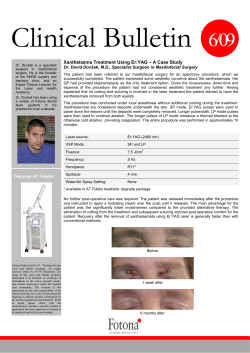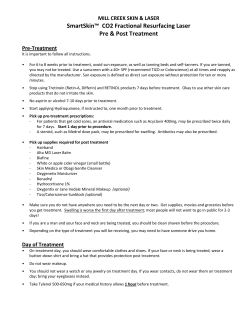
Disturbing floaters Tassignon Marie-José ,MD, PhD, FEBO Antwerp University Hospital SFO 2013
Disturbing floaters Tassignon Marie-José ,MD, PhD, FEBO Antwerp University Hospital SFO 2013 Thanks Jos Rozema PhD, DrSci Frans Van de Velde MD, PhD Financial interest: None in the vitreoscope Travel Ellex Company Intellectuel interest « bag-in-the-lens » What do we know about floaters except that they bother patient and ophthalmologist !! • Classification of floaters • Subjective complaints of the patient • How to objectivate floaters • How to treat floaters • Why interest for floaters Classification of floaters • Type I: Well defined and suspended floaters • Type II: Multiple floaters disperced in the vitreous • Type III: Well defined floaters for the patient but visible for the clinician T Vandorselaer; F Van de Velde; MJ Tassignon, 2001; Eligibility for Nd:YAG laser treatment of highly symptomatic floaters; Bull Soc belge Ophtalmol: 280, 15-22 Type I: Well specified and suspended floaters Type II: Multiple and disperced floaters Classification of floaters: - visible during examination of the fundus - well suspended (Type I) by vitreal strands - located mid-vitreum - speed of movement depends of the viscosity of the vitreum Type III: Floaters not objectivated by the ophthalmologist! • They are perceived to be very well defined and very contrasting • But… the ophthalmologist doesn’t see them !! • Where are they?: • In the premacular bursa (although not visible on OCT) Subjective complaints of patients dealing with floaters • Experience of pressure in the eye • Tend to rub the eye to try to remove the obstacle • Blurred view • Frequent eye movements to displace the obstacle • Frequent blinking of the eyelids • Visual obsession • Impression of lacrimation • Reading and specific tasks are difficult to manage because of floaters • ... And there are many other !! How to objectify floaters ? • Ophtalmological examination of vitreum • Vitreoscope • Questionnaire The vitreoscope allows the patient to objectivate their own floaters = blue field entoscope Vitréoscope de J Rozema, 2010 Treatment of floaters YAG laser for type I: “well defined and suspended” YAG Laser specific for the vitreum: only “Ellex Ultra Q” exists How to treat: aim the inferior strands to which the floaters are suspended in order to displace them superiorly (principle of the spider web) Vitrectomy + PVD for Types II and III Why the interest for floaters ? Complex optical implants require a perfect transparency of the environment, also of the vitreum, in order to obtain an optimal image quality Thanks for your attention marie-jose.tassignon@uza.be
© Copyright 2025











